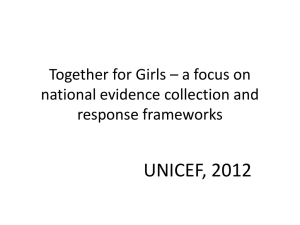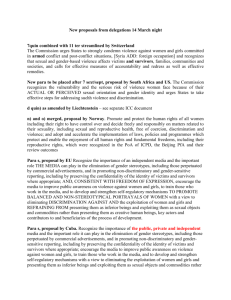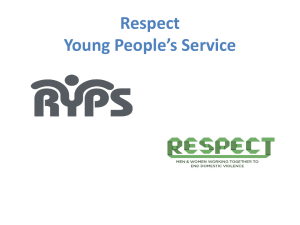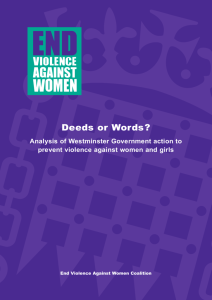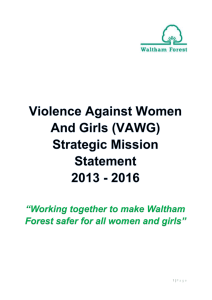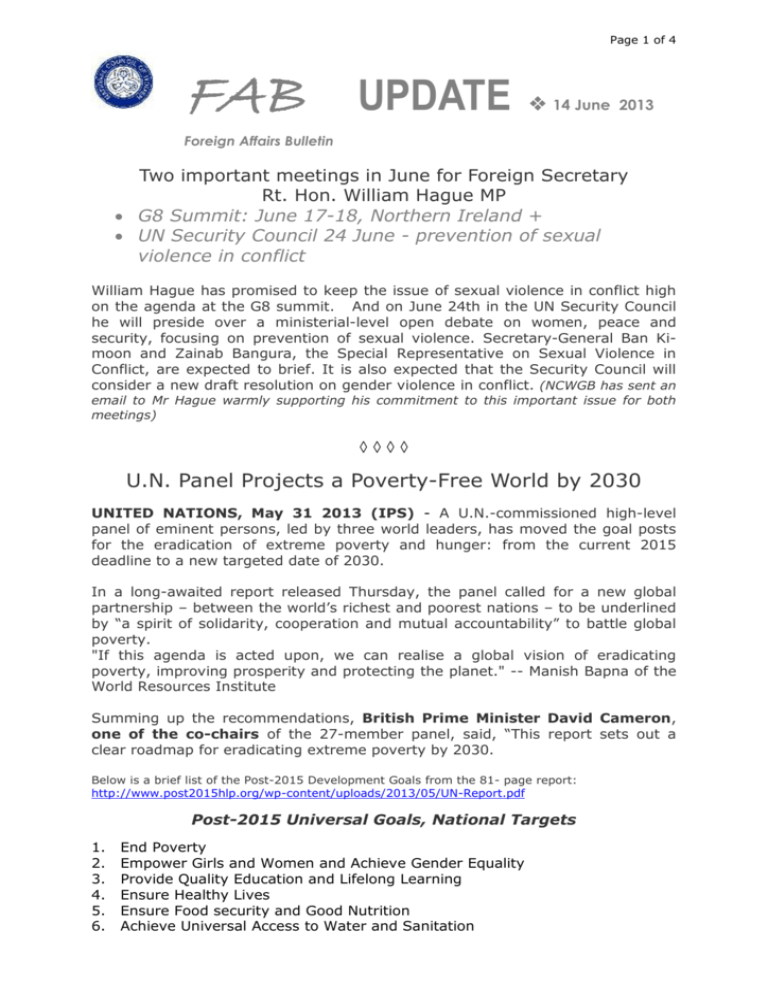
Page 1 of 4
FAB
UPDATE
14 June
2013
Foreign Affairs Bulletin
Two important meetings in June for Foreign Secretary
Rt. Hon. William Hague MP
G8 Summit: June 17-18, Northern Ireland +
UN Security Council 24 June - prevention of sexual
violence in conflict
William Hague has promised to keep the issue of sexual violence in conflict high
on the agenda at the G8 summit. And on June 24th in the UN Security Council
he will preside over a ministerial-level open debate on women, peace and
security, focusing on prevention of sexual violence. Secretary-General Ban Kimoon and Zainab Bangura, the Special Representative on Sexual Violence in
Conflict, are expected to brief. It is also expected that the Security Council will
consider a new draft resolution on gender violence in conflict. (NCWGB has sent an
email to Mr Hague warmly supporting his commitment to this important issue for both
meetings)
◊◊◊◊
U.N. Panel Projects a Poverty-Free World by 2030
UNITED NATIONS, May 31 2013 (IPS) - A U.N.-commissioned high-level
panel of eminent persons, led by three world leaders, has moved the goal posts
for the eradication of extreme poverty and hunger: from the current 2015
deadline to a new targeted date of 2030.
In a long-awaited report released Thursday, the panel called for a new global
partnership – between the world’s richest and poorest nations – to be underlined
by “a spirit of solidarity, cooperation and mutual accountability” to battle global
poverty.
"If this agenda is acted upon, we can realise a global vision of eradicating
poverty, improving prosperity and protecting the planet." -- Manish Bapna of the
World Resources Institute
Summing up the recommendations, British Prime Minister David Cameron,
one of the co-chairs of the 27-member panel, said, “This report sets out a
clear roadmap for eradicating extreme poverty by 2030.
Below is a brief list of the Post-2015 Development Goals from the 81- page report:
http://www.post2015hlp.org/wp-content/uploads/2013/05/UN-Report.pdf
Post-2015 Universal Goals, National Targets
1.
2.
3.
4.
5.
6.
End Poverty
Empower Girls and Women and Achieve Gender Equality
Provide Quality Education and Lifelong Learning
Ensure Healthy Lives
Ensure Food security and Good Nutrition
Achieve Universal Access to Water and Sanitation
7.
8.
9.
10.
11.
12.
Page 2 of 4
Secure Sustainable Energy
Create Jobs, Sustainable Livelihoods, and Equitable Growth
Manage Natural Resource Assets Sustainably
Ensure Good Governance and Effective Institutions
Ensure Stable and peaceful Societies
Create a Global Enabling Environment and Catalyse Long-Term Finance
◊◊◊◊
Tackling Female Genital Mutilation in the UK:
What works in community-based prevention work.
An invitation to this event - which will be hosted by Jane Ellison MP, founder of the All
Party Parliamentary Group on FGM, and is to be held on:
Monday 1 July 2013, 3.30-5pm in the Attlee Suite, Portcullis House,
Houses of Parliament.
Guest speakers:
Jeremy Browne MP, Minister of State for Crime Prevention
Naana Otoo-Oyortey, Executive Director, FORWARD
This event will launch the findings of a 3-year evaluation of a grass-roots Special
Initiative to reduce the risk of Female Genital Mutilation to girls and women in the UK. It
will also mark the launch of Phase II of this Special Initiative, supported by a £1.6 million
investment by Esmée Fairbairn Foundation, Trust for London, Comic Relief and Rosa, the
UK Fund for Women and Girls.
In Phase I, the Special Initiative invested £1m over a three-year period to 14 community
organisations based within affected communities across the country.
The report on the work of Phase I of the Special Initiative is unique in the UK. It shows a
clear change in community attitudes over the past three years for the groups involved. It
also highlights effective practice models, gaps in provision and, crucially, provides
recommendations for policy makers. Drinks and light refreshments will be served.
Could you please RSVP by Monday, 17th June at the latest to Hekate Papadaki at
Hekate@rosafund.org. Places will be limited so please book early
◊◊◊◊
SUMMARY OF AGREED CONCLUSIONS ON THE ELIMINATION AND
PREVENTION OF ALL FORMS OF VIOLENCE AGAINST WOMEN AND GIRLS
UNITED NATIONS COMMISSION ON THE STATUS OF WOMEN 2013.
With acknowledgment to IMKAAN for this Summary
The Agreed Conclusions affirm:
1. The important role of Prevention and Elimination of Discrimination
2. The Right to Education as a Human Right and the elimination of illiteracy,
ensuring equal access to education, in particular in remote and rural areas.
Closing the gender gap at all levels of education empowers women and girls and
contributes to elimination of all forms of discrimination and Violence Against
Women and Girls.
3. The Commission urges States to strongly condemn all forms of VAWG and to
refrain from invoking custom, tradition or religion to avoid their
obligations as set out in the Declaration on the Elimination of Violence Against
Women.
Page 3 of 4
4. States should ensure that women and girls have access to justice and
effective legal assistance and processes.
5. States should develop and implement multi-sectoral national policies,
strategies and programmes with the effective participation of women and girls
which include measures for prevention, protection, support services, data
collection, research, monitoring and evaluation and national benchmarks
for results to be achieved.
6. States should adopt and fund policy reforms and programmes and support
education to train and strengthen the capacity of the judiciary, police,
military, those working in education, health, social welfare, justice,
defence and immigration. Hold public officials accountable for not complying
with laws and regulations related to VAWG.
7. Recognise the Role of the Media in the elimination of gender
stereotypes and in promoting non-discriminatory and gender-sensitive
reporting and in improving public awareness of VAWG. Develop and strengthen
self-regulatory mechanisms to promote balanced and non-stereotypical
portrayals of women as creative human beings, key actors and contributors to
and beneficiaries of the process of development.
8. Support the development and Use of ICT and social media as a resource for
the empowerment of women and girls including access to information on
prevention and responses to VAWG.
Combat the use of ICT and social
media to perpetrate sexual harassment, exploitation, child pornography,
trafficking, cyber stalking and bullying.
9. Adopt and implement measures to ensure the social and legal inclusion
and protection of women migrants, including women migrant workers.
10. Eliminate discrimination and violence against women and girls living with
HIV/AIDS
11. Ensure that in armed conflict and post-conflict situations, sexual and
gender-based violence are prioritised and addressed through
investigation, prosecution and punishment of perpetrators to end
impunity and remove barriers to women's justice.
This includes
establishing mechanisms of complaint and reporting, access to health care,
including sexual and reproductive health services.
(Presented by Monica Tolman to the joint NCW FA/ICWGB Committee meeting on 6 June 2013)
◊◊◊◊
States accountable for investigating and preventing violence
against women
GENEVA (10 June 2013) – States need to be held accountable not only for
investigating all acts of violence against women but also for failing to prevent
such violence, an independent United Nations human rights expert has said.
“The State has an obligation to investigate all acts of violence against women,
including systemic failures to prevent violence against women,” said Special
Rapporteur on Violence against women, Rashida Manjoo.
“There is a need to create a framework for discussing the responsibility of States
to act with due diligence,” she said.
Page 4 of 4
“States are required to hold accountable those who fail to protect and prevent,
as well as those who perpetrate, violations of women’s rights.”
The responsibility of States is generally based on acts or omissions either
committed by State actors or by actors whose actions are attributable to the
State. But a State may incur responsibility where there is a failure to exercise
due diligence to prevent or respond to certain acts or omissions of non-state
actors.
“The due diligence standard serves as a tool for rights-holders to hold States
accountable, by providing an assessment framework for ascertaining what
constitutes effective fulfilment of a State’s obligations, and for analysing its
actions or omissions,” Ms. Manjoo said.
But human rights due diligence required constant investigation and evaluation to
assess whether universally accepted human rights principles apply in a State’s
own behaviour and in a State’s monitoring of third party behaviour – be they
individuals or an organization, the Special Rapporteur added.
Ms. Manjoo stressed that there is a need to create a framework for discussing
the responsibility of States to act with due diligence, through separating the due
diligence standard into two categories: individual due diligence which States owe
to individual victims of violence, and systemic due diligence which requires
States’ obligations to create a functioning system to eliminate violence against
women.
Due diligence can include ensuring effective investigations, prosecution and
sanctions; guaranteeing access to adequate and effective judicial remedies; and
treating women victims and their relatives with respect and dignity throughout
the legal process.
Other key factors are ensuring comprehensive reparations to victims and their
relatives; identifying certain groups of women as being at particular risk;
modifying the social and cultural patterns of conduct of men and women; and
eliminating prejudices.
Ms. Manjoo presented her fourth thematic report on the issue of State responsibility for eliminating
violence against women to the Human Rights Council on 3 June.
◊◊◊◊
News in Brief:
UN Women's Lakshmi Puri: 'Priority is to Power On'
7 June 2013: At the sidelines of last week's major global forum on women's health, the
interim leader of the 2-year-old U.N. superagency expressed pride in its start-up phase
of rapid institution-building and is focused on everything from field work to raising a
target annual budget of $300 million. She talked with Women's eNews at the Women
Deliver conference, a major global forum on the health of women and girls held here last
week, about her agenda and the challenges she faces while at the helm of the
superagency, which consolidated four previous U.N. women's rights agencies.
http://womensenews.org/story/leadership/130606/un-womens-lakshmi-puri-priority-power
◊◊◊◊
(If you wish to give feedback on FAB please contact Sheila Petersen at sp.arn77@gmail.com)




